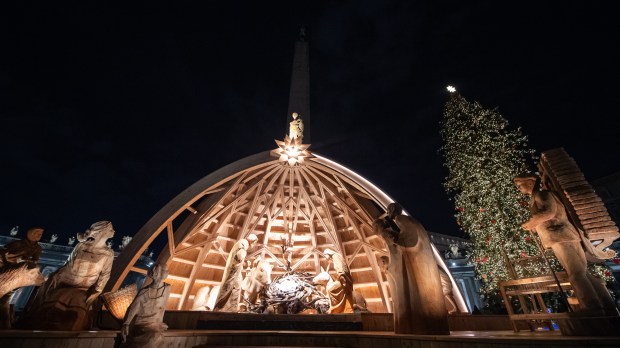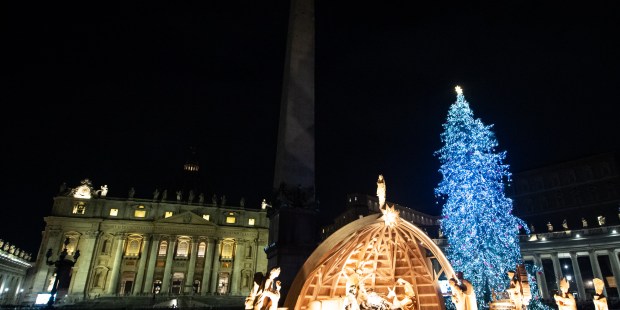On December 3, Pope Francis thanked those who donated and worked to bring about the Vatican’s Christmas displays, both in St. Peter’s Square and in Paul VI Hall.
He invited the faithful to two “human and Christian attitudes” that we can learn from the Christmas tree and the Nativity scene.
Here’s what he said:
~
The tree and Nativity display are two signs that continue to charm young and old. The tree, with its lights, reminds us of Jesus who comes to illuminate our darkness, our existence often closed up in the shadow of sin, fear and pain. And it suggests to us a further reflection: Like trees, people too need roots. Because only if it is rooted in good soil can it stay firm, grow, “mature,” and resist the winds that shake it, becoming a point of reference to those who look at it. But, dear friends, without roots none of this can happen; without firm foundation it remains unstable. It is important to safeguard the roots, in life as well as faith. In this regard, the apostle Paul reminds us of the foundation in which to root our lives in order to remain firm: he says to remain “rooted in Jesus Christ” (Col 2:7). This is what the Christmas tree reminds us of: to be rooted in Jesus Christ.
And so we come to the Nativity scene, which speaks to us of the birth of the Son of God who became man to be close to each one of us. In its genuine poverty, the Nativity scene helps us to rediscover the true richness of Christmas, and to purify ourselves of so many aspects that pollute the Christmas landscape. Simple and familiar, the Nativity scene recalls a Christmas that is different from the consumerist and commercial Christmas: it is something else; it reminds us how good it is for us to cherish moments of silence and prayer in our days, often overwhelmed by frenzy. Silence fosters contemplation of the Child Jesus, helps us to become intimate with God, with the fragile simplicity of a tiny newborn baby, with the meekness of his being laid down, with the tender affection of the swaddling clothes that envelop him.
Roots and contemplation: The tree teaches us about roots, the Nativity scene invites us to contemplation. Let us not forget these two human and Christian attitudes. And if we truly want to celebrate Christmas, let us rediscover through the Nativity scene the surprise and amazement of smallness, the smallness of God, who makes himself small, who is not born in the splendour of appearances, but in the poverty of a stable.
And to meet Him one must reach Him there, where He is; one must lower oneself, one must make oneself small, leave all vanity behind, to arrive where He is. And prayer is the best way to say thank you before this gift of free love, to say thank you to Jesus who wishes to enter our homes and our hearts. Yes, God loves us so much that he shares our humanity and our lives. He never leaves us by ourselves, He is at our side in all circumstances, in joy as in sorrow. Even in the worst moments, He is there, because He is the Emmanuel, the God with us, the light that illuminates the darkness and the tender presence that accompanies us on our journey.


